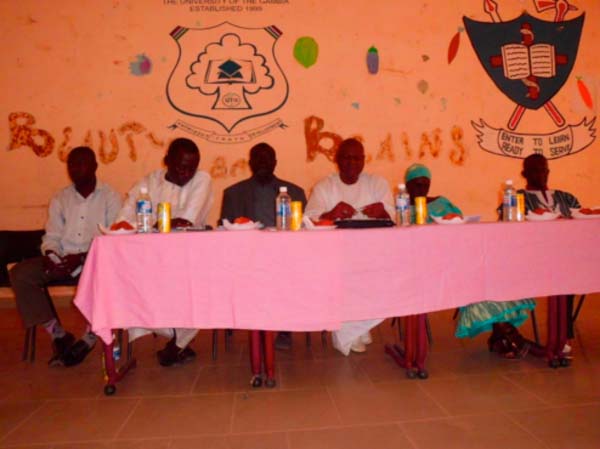
Ousainou Lome, Head of Department, School of Education, while declaring the forum opened, said the school continues to train teachers who in turn train those who will develop the nation.
Abubakar Jallow, principal of Gambia College, said if society is a vehicle, the teachers are the drivers.
“The UTG is a factory where people are processed and anyone who comes out as finished product technically should not look for a job, but job be looking for you,” he said.
Momodou S. Sowe, president of UTG Students’ Union, said teaching and learning should not stop at school, but consultation should be made with the society so as to broaden scopes to meet the demands of Gambians.
Lang Sarjo Jadama, lecturer at the School of Education, dwelled on the role of university education in politics and governance as embodied in the UTG vision and mission statements.
He said the UTG serves as the powerhouse of transferring knowledge to students and providing high quality education to all those who qualified for enrolment.
“The UTG as a centre of excellence continues to provide relevant education to all,” he said.
Isatou Ndow, head of School of Education of the Gambia College and gender lecturer, presented a paper on gender and education.
She pointed out that sex is confused with gender.“Sex is biological difference between men and women and it is determined before birth, while gender is the different roles of men and women in society.”
“Biological difference should not be a justification for inequality,” she said.“Gender can be a key determinant to who gets education in some communities.But the more educated a woman is the fewer children she produced and the healthier the population is.Therefore, the society should treat both boys and girls equally.”
Ebrima Sissaho, deputy permanent secretary at the Ministry of Basic and Secondary Education (MoBSE), dilated on education and social entrepreneurship, saying education is the key to the productivity of every sector.
“Improvement of the society depends largely on the knowledge and education of its citizens,” he said.“Most countries transformed their societies by investing more on education.”
Momodou Katim Touray, deputy permanent secretary at the Ministry of Higher Education, Research, Science and Technology (MoHERST), spoke on the role of science and technology in education.
He said though there is empirical evidence that education generally increases productivity, science is a catalyst to sociable development.
“Scientific innovations have increase access to education through the use of equipment such as computers,” Mr Touray said.“The use of science and technology in education has transformed some teaching methods by making teaching easier.”
Suleyman Ceesay, president of EDUSA, in his activity report, called on students of the School of Education to register with the association, so that together they can bring in more positive developments to the university.





